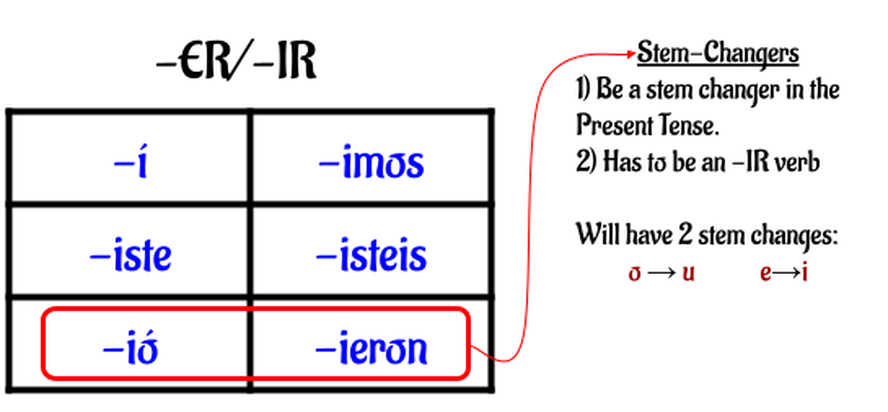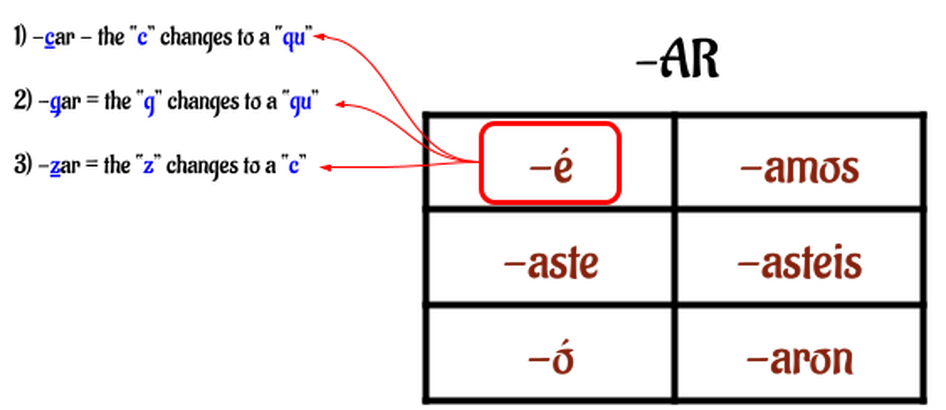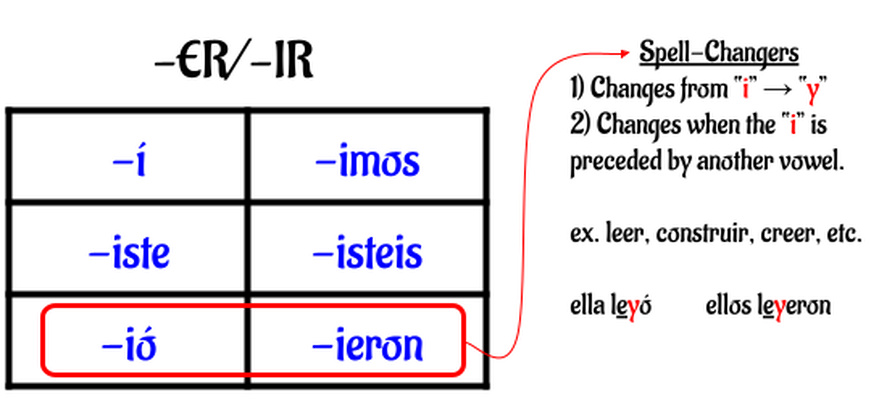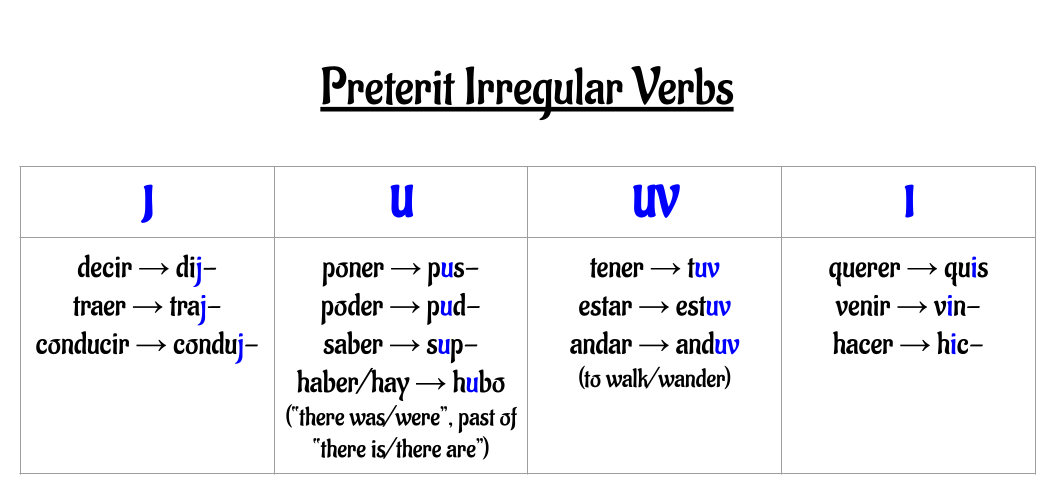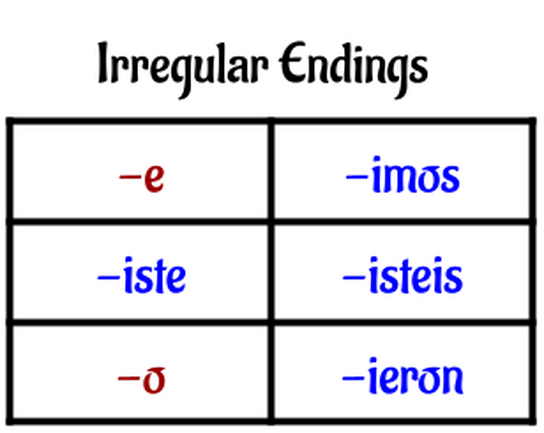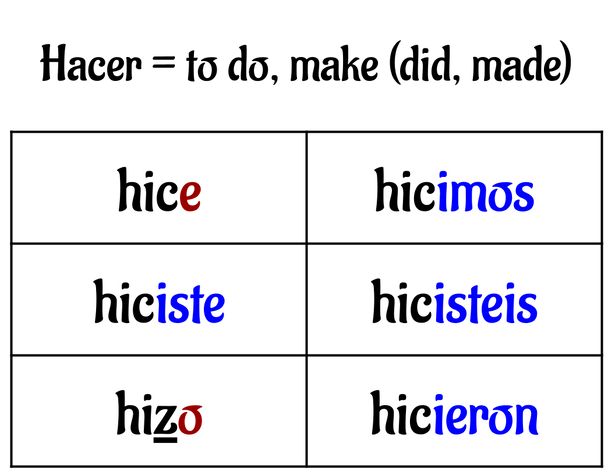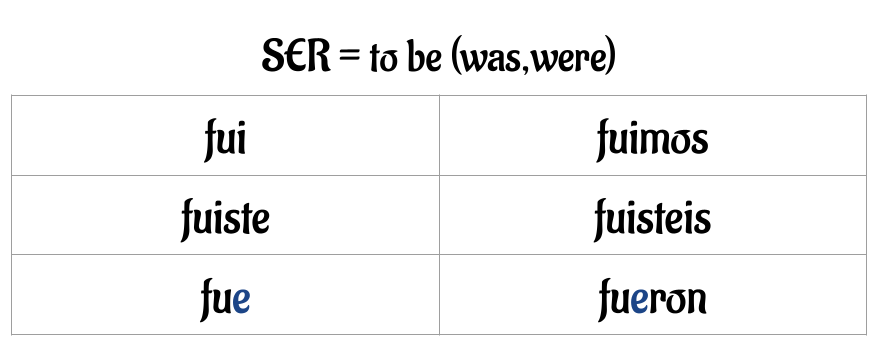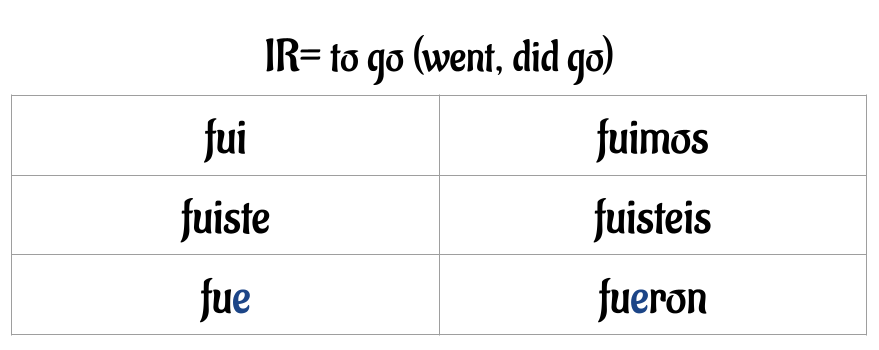Stem-Changers, Spell Changers and Irregular Preterit
Here is part 2 for the Preterit, that addresses the Stem-changers, Spell Changers and the Irregular verbs in the preterit.
Concept 2 Preterit: Stem-Changers
All of the stem changers still use the Regular Preterit endings, only they have a spell change. As is indicated in the image below, the verbs that have a stem-change are those that are 1) Stem-change in the present tense and 2) are -IR verbs. The other verbs are end with -AR and -ER that are stem-changers in the present tense, will NOT stem change in the Preterit. They will follow regular verb rules... except those that fall under the category of the Irregular Preterit verbs. (see explanation below)
|
Mis amigos pidieron pizza en el restaurante anoche.
My friends ordered pizza in the restaurant last night. Mi gato durmió todo el día en mi cama ayer. My cat slept all day on my bed yesterday. Alejandra sirvió la comida a la familia Torres ya. Alejandra served the food to the Torres Family already. |
Concept 3 Preterit: Spell Changers
There are two types of spell changes we will deal with in the Preterit. The first is with AR verbs and this change happens because of the relationship between vowels and the consonants. Recall that in Spanish "G" will make the hard sound-like the G in "goat"-with the vowels A, O, and U. But, it makes the smooth "G" sound, like an "H" in English, when followed by the vowels E or I. Likewise "C" has the same phonetic changes - C with A, O, or U will make it hard-like the [k] "Cat"-and C becomes smooth with E or I-like the [s] in "Cinema".
Because the "Yo" form for the -AR Preterit is a stressed "E", the following changes occur, as is indicated in the image below.
Because the "Yo" form for the -AR Preterit is a stressed "E", the following changes occur, as is indicated in the image below.
|
sacar
pagar
comenzar
|
Ya saqué la basura para mi abuela.
I already took out the trash for my grandma. Yo no pagué la cuenta porque Carlos ya la había pagado. I did not pay the bill because Carlos had already paid it. Yo comencé a trabajar a las tres esta mañana. I began working at three this morning. |
|
Mis padres no creyeron las noticias del fuego en nuestro barrio.
My parents did not believe the news about the fire in our neighborhood. Alejandra leyó todos los libros para su clase de inglés. Alejandra read all the books for her English class. |
Here you can practice to learn and memorize the verb conjugations through StudySpanish.com. Understand that "Orthographic" refers to the Spell changing verbs.
Concept 4 Preterit: Irregulars - JUUV I Verbs
There are some verbs in Spanish that have an irregular stem coupled with specific endings that are NOT normal. We will call these JUUVI verbs. There are 4 categories of JUUVI verbs. There are verbs that have a "J" in the stem in common. There are verbs that have "U" in the stem in common. There are verbs that have "UV" in the stem in common. There are verbs that have "I" in the stem in common. Put those letters together and that is why we call these verbs J-U-UV-I verbs to help us remember. Again, these are verbs that do NOT have a regular stem. You will recognize these 13 verbs:
Unlike the present tense, the irregulars for the preterit change their stem entirely, AND they have their own verb endings, separate from the other endings. There is no real method or pattern to recognizing the verbs that are irregular in the preterit other than memorizing them as they are crossed through experience with the language.
Note that the endings for the irregulars shares the endings from the -AR and -ER/-IR charts, and there are no accents in the 1st and 3rd Person Singular.
Note that the endings for the irregulars shares the endings from the -AR and -ER/-IR charts, and there are no accents in the 1st and 3rd Person Singular.
Also keep in mind when conjugating the verb HACER, there is a spell change in the 3rd person singular because of phonetic interaction of the vowel "O" with the consonant "C". See the conjugation chart below.
Concept 5 Preterit: Big 4 Verbs (IR/SER, DAR/VER)
These four essential verbs don't fit into any of the other 4 categories and are "different" for their own reasons. Note that these 4 verbs DO NOT have accents. You will only have to worry about accents with regulars, spell changers, and stem changers.
*The only irregular aspect to this verb is NO ACCENTS, the endings are actually normal.
Notice DAR takes ER/IR endings, not AR endings. It looks just like the VER conugations.
Notice these forms are strange, but we are used to SER being weird.
Okay, so this is weird and you will have to accept it! The Preterite forms for IR are the SAME as the forms for SER. Why does Spanish do this to us?? (no answer) You will have to be careful with using context to know if YO FUI= I went/did go (for the verb IR), or I was (for the verb SER).
*Notice context matters in telling the difference between fue in the following two sentences.
|
Él fue al concierto con su novia.
He went (did go) to the concert with his girlfriend. Mi abuelo fue un abogado. My grandfather was a lawyer. |
Closing thoughts on the Preterite tense
There are five parts/sections/concepts to study know if you want to be competent with communicating in the Preterite (simple past) tense.
|
1) Preterite Regular Verbs
2) Preterite Spell Changing Verbs (Car’s, Gar’s, Zar’s, I-Y) 3) Preterite Stem Changing Verbs (o-u, e-i, slipper,...) 4) Preterite JUUVI verbs (13 irregular stems with special irregular endings) 5) Preterite Big 4 (IR/SER, VER/DAR) |
